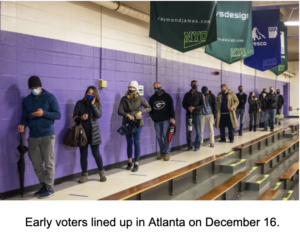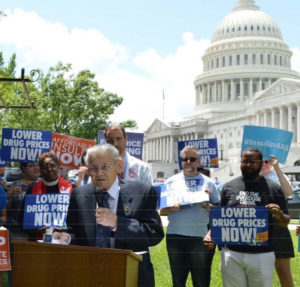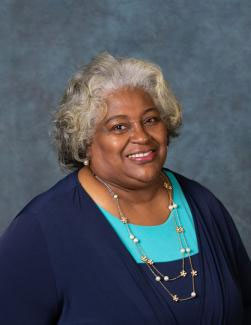
People 65 And Older Express Frustration, And Excitement, As They Get Vaccinated Against COVID-19 in Broward County
COVID-19 vaccinations started in Broward County this past weekend, for people who are 65 and older, while healthcare workers and people in long-term care facilities have been getting the vaccine since December.
Noreen Stephens and her husband, Larry, drove to Davie’s Vista View Park from Hollywood on Jan. 3, and arrived at about 6 a.m. Stephens sat in the passenger seat of their vehicle and said through the window that they couldn’t be happier to be vaccinated against COVID-19.
“I am so grateful that the county did this for seniors,” Stephens said. “We’ve been so scared for so many months, stuck in the house, so, thank goodness.”
They said they got an appointment online, and then it took a while to confirm by phone.
“You can’t give up, you have to keep trying and trying,” she added. “It was a two-hour process to get the appointment.”
The couple left a few hours after they got there. COVID-19 vaccinations started on Jan. 3 in Broward County for people who are 65 and older, while healthcare workers and people in long-term care facilities have been getting the vaccine since December.
The U.S. Centers for Disease Control and Prevention recommended vaccinating frontline essential workers after healthcare workers but Gov. Ron DeSantis chose to include seniors next instead. Read More

FLARA needs your support! Your generosity is what allows FLARA to continue offering quality events and political engagement. All donations of $30 or more will receive a FLARA face mask!!! (while supplies last)
[ DONATE TODAY ]
Florida Agriculture Commissioner recommends DeSantis mobilize National Guard
“We are the first in the nation to begin offering vaccine to staff and residents of long term care facilities,” Gov. Ron DeSantis said.
DeSantis touted that Florida is the first to mobilize county health departments and county emergency managers to actively vaccinate seniors 65 and older, however he also adds supply is limited.
“We don’t’ have enough vaccine currently on hand for all four million plus senior citizens in the state of Florida. Now we will get there but it’s not going to happen overnight, so please be patient,” DeSantis said.
Agriculture Commissioner Nikki Fried says even with our supply: “While Florida has received over 1.2 million doses of COVID-19 vaccine, only 146,160 vaccine doses have been administered.”
Fried sent a letter to the governor Wednesday strongly recommending him to mobilize the National Guard to fix the COVID-19 vaccine distribution which she says, according to reports, is very chaotic and lacks of clear strategy to vaccinate the public. She also said “health care professionals have lacked clear direction from the state”
When asked about more call centers or more help the governor says: “If the hospitals need some support, we will be willing to provide that. We had some discussions with some of the big systems about maybe they could use some more nurses.”
As far as long lines, DeSantis said it’s important for hospitals to communicate with people. Read More
U.S. Supreme Court Set To Hear Florida-Georgia Water Battle
After years of battling between Florida and Georgia, the U.S. Supreme Court next month will again take up a dispute about water in a river system that links the two states.
The Supreme Court last week scheduled oral arguments Feb. 22 in the case about divvying up water in the Apalachicola-Chattahoochee-Flint river system, which stretches from northern Georgia to Apalachicola Bay in Franklin County.
Florida filed the lawsuit in 2013, though the two states have fought for decades about water in the river system. Florida contends that Georgia is using too much water from the system, damaging the Apalachicola River and the long-iconic oyster industry in Apalachicola Bay.
Federal appellate Judge Paul Kelly, a special master appointed by the Supreme Court, dealt a blow to Florida in December 2019 when he said Florida had not adequately shown that Georgia’s water use caused problems in the Apalachicola River and Apalachicola Bay.
Kelly’s recommendation went to the Supreme Court, where Florida and Georgia in 2020 filed briefs that gave vastly different descriptions of the issues.
In one brief, Florida’s attorneys attacked Kelly’s findings and argued that “Georgia’s insatiable upstream consumption (of water) has decimated Apalachicola’s oyster fisheries.”
“The harm to the Bay’s oyster fisheries is undeniable. Apalachicola is renowned across America for its oysters, which account for 90% of Florida’s oyster harvest and 10% of the nation’s,” the brief said. “What’s more, oysters — and oystering — have created a distinct way of life in Apalachicola passed down from generation-to-generation; whole communities depend on the fisheries for their economic livelihood. The oyster is to Apalachicola what the lobster is to many New England towns.” Read More
The Alliance wishes all of our members a healthy, safe and happy 2021!
Those Over Age 75, Essential Frontline Workers Should Be Next in Line for Covid Vaccine
The Advisory Committee on Immunization Practices (ACIP), a federal panel advising the Centers for Disease Control and Prevention, has approved recommendations that people over the age of 75 and essential frontline workers be next in line for the Covid-19 vaccines. They would follow the health care workers, nursing home residents and staff vaccinated during the initial phase of the inoculations.
The panel’s recommendations are non-binding and state officials will make the final decisions on the order of vaccinations; however, many states are looking to ACIP to help them settle challenging ethical questions over the distribution of the scarce supply of doses.
About 20 million people are 75 or older and there are about 30 million front-line workers, including police, firefighters, teachers and grocery workers. Seniors between the ages of 65-74, other essential workers and people between the ages of 16-64 with high-risk conditions would be inoculated after those groups.
“The recommendations reflect the fact that seniors are the most likely to face serious illness or death from the virus,” said Alliance Executive Director Richard Fiesta. “Unfortunately it will take months to complete the process. We must continue to wear our masks and social distance as much as possible in the meantime. Please follow the CDC guidelines.”
Nursing Home Occupancy is Down Sharply Across the Nation
The pandemic is changing the way Americans care for seniors, with a growing number of families opting for in-home care over nursing homes. Nursing home use has been decreasing gradually for years, with occupancy in 2019 at 80%, down from 84% a decade earlier. The pandemic has accelerated the trend due to deaths, fear of infection and family members’ concerns over restricted visitation at the facilities.
This year alone occupancy in nursing homes is down 15%, or more than 195,000 residents. More than 115,000 deaths caused by Covid-19 have been linked to long-term care facilities.
Nursing-home operators say that rising numbers of baby boomers with a need for institutional care will drive occupancy rates back up.
Surveys have long shown many seniors prefer aging at home, and the pandemic has made nursing homes even less popular, according to a September survey of adults 40 and older by AARP. Just 7% said they would prefer a nursing home for family members needing long-term care, and 6% said they would choose one for themselves. Nearly three in 10 respondents said the pandemic had made them less likely to choose institutional care.
“Once the pandemic is over, long term care trends are unlikely to return quickly to the way they were,” said Robert Roach, Jr., President of the Alliance. “We are going to see the after-effects from the pandemic for a long time, with more seniors aging in place, before demographic changes bring the number of nursing home residents back up.”
Scam Alert: Seniors Being Targeted With Promise of Early Access to Covid Vaccine
Public health officials are warning the public of scammers who promise early access to the vaccine in exchange for sensitive personal information.
Beware of any call from someone asking for your Social Security number or credit card information in conjunction with the vaccine. No legitimate doctor’s office, pharmacy or insurance company would call asking for this information.
 “Be on the lookout for those contacting you via phone, text and email,” said Joseph Peters, Jr., Secretary-Treasurer of the Alliance. “If what they are offering seems too good to be true, it probably is. Access to the vaccine is strictly controlled, so do not believe strangers saying they have early access.”
“Be on the lookout for those contacting you via phone, text and email,” said Joseph Peters, Jr., Secretary-Treasurer of the Alliance. “If what they are offering seems too good to be true, it probably is. Access to the vaccine is strictly controlled, so do not believe strangers saying they have early access.”
If you receive one of these solicitations, experts say the best thing to do is hang up immediately. Do not open or respond to any messages or click on any links or email attachments from unknown sources. If you are unsure about a message, check with your healthcare provider, as they will be able to pass on the most accurate information about the vaccine.
Georgia Senate Runoffs are Only Five Days Away
Retiree-led phone banks will continue this week as the important Georgia Senate runoff elections approach. With only a few days left until Election Day on January 5th, Alliance members from all states are invited to call Georgia voters in support of Democratic candidates Jon Ossoff and Raphael Warnock. The next shift will take place on January 2nd, 2021 at 2:00pm Eastern Time. Click here to sign up.
 The early voting period is well underway, and the number of voters turning out for the election is breaking records. According to an NBC News data analysis, almost 70,000 voters have registered in the state since the general election in November.
The early voting period is well underway, and the number of voters turning out for the election is breaking records. According to an NBC News data analysis, almost 70,000 voters have registered in the state since the general election in November.
“Given how close the races were during the general election, any slight shifts in voter turnout can determine the winners,” said President Roach. “A phone call really could make a big difference.”


 Source: APWU Health Plan Newsletter
Source: APWU Health Plan Newsletter


 Kenyon “Ken” Pease, Former National Business Agent [Clerk Division], Washington, DC Region passed away Saturday, January 2, 2021.
Kenyon “Ken” Pease, Former National Business Agent [Clerk Division], Washington, DC Region passed away Saturday, January 2, 2021. 

 “Be on the lookout for those contacting you via phone, text and email,” said Joseph Peters, Jr., Secretary-Treasurer of the Alliance. “If what they are offering seems too good to be true, it probably is. Access to the vaccine is strictly controlled, so do not believe strangers saying they have early access.”
“Be on the lookout for those contacting you via phone, text and email,” said Joseph Peters, Jr., Secretary-Treasurer of the Alliance. “If what they are offering seems too good to be true, it probably is. Access to the vaccine is strictly controlled, so do not believe strangers saying they have early access.” The early voting period is well underway, and the number of voters turning out for the election is breaking records. According to an NBC News data analysis,
The early voting period is well underway, and the number of voters turning out for the election is breaking records. According to an NBC News data analysis,  Thank you to my sister and brother postal workers for showing up and moving the mail in service to America. Thank you to all of the veterans and all the active military personnel for your service; thank you to all the essential workers who are our families, our friends, our neighbors for your continued service.
Thank you to my sister and brother postal workers for showing up and moving the mail in service to America. Thank you to all of the veterans and all the active military personnel for your service; thank you to all the essential workers who are our families, our friends, our neighbors for your continued service.